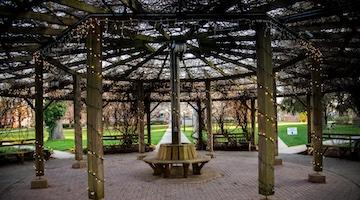
Pergola Magazine
A new literary journal curated by Hood MFA students—now accepting submissions!
Hood College’s low-residency MFA in creative writing immerses students in the rhythms of the writing life, while providing them with a solid foundation in literary craft, criticism and publishing.
Ideal for working professionals and lifelong learners who are serious about their work, the MFA in creative writing appeals to students from a variety of personal and professional backgrounds, all of whom share a passion for literature and a desire to write and publish their own novels, stories and poems. Central to our philosophy is the idea of balance—between writing and the demands of everyday life, between periods of solitude and social interaction—as well as the presence of a diverse and cohesive literary community. By the end of the program, students will have produced a book-length manuscript of poetry or prose and will be beginning to submit and publish their work.
“The residency was a life-changing experience for me, and I think this program is the perfect match for my professional and creative needs.” -Maui Smith, current student
A 48-credit program with concentrations in poetry or prose, the low-residency MFA in creative writing involves four remote mentorship semesters and three on-campus summer residencies. Over the course of the two-year program, students will engage in one-on-one consultations with faculty mentors; participate in intensive writing workshops; attend lectures, panels and readings; begin submitting their work for publication; develop and present a craft lecture; complete a book-length creative project; and give a reading from their work. In addition to summer residences on the beautiful Hood College campus in Frederick, Maryland, students also have the option of attending an international summer residency through the Prague Summer Program for Writers, the nation’s oldest study-abroad program for creative writers in the English language. View the latest Hood MFA newsletter here.
Prospective Applicants must complete the following for consideration into the program:
The course listing for the program is as follows:
| Course | Credits |
| CW 500A: First Residency | 6 |
| CW 500B: Second Residency | 6 |
| CW 500C: Third Residency | 6 |
| CW 501PR or CW 501P: Mentorship Semester I | 4 |
| CW 502PR or CW 502P: Mentorship Semester II | 4 |
| CW 503PR or CW 503P: Mentorship Semester III | 4 |
| CW 504PR or CW 504P: Mentorship Semester IV | 4 |
| CW 505: Literary Publishing | 2 |
| CW 506: Research Project | 4 |
| CW 507: Creative Writing Thesis | 4 |
| CW 508: Oral Presentation | 4 |
| Total Program Credits | 48 |
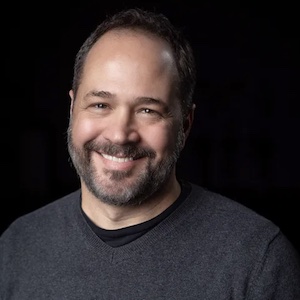
Aaron Angello (he/him) is an assistant professor of English at Hood College, where he directs the theatre program and teaches courses in creative writing, modern and contemporary poetry, film and media, and drama. He is also creative director of the Endangered Species (theatre) Project and founder of the Frederick Shakespeare Festival. His poetry and essays have appeared in numerous journals, and he is the editor of The Synergistic Classroom: Interdisciplinary Teaching in the Small College Setting. His genre-defying book The Fact of Memory: 114 Ruminations and Fabrications was published in 2022 by Rose Metal Press.
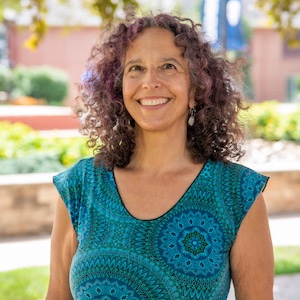
Amy Gottfried (she/her) is a professor of English at Hood College and advises the undergraduate literary magazine, Wisteria. She teaches courses in environmental writing, advanced fiction, and American literature, and has twice earned Hood’s Excellence in Teaching award. Her short fiction has appeared in Passager, Glimmer Train, Adirondack Review, Blunderbuss and Brain, Teen. Awards include Blunderbuss’s 2015 Best Stories and Glimmer Train’s Fiction Open, Family Matters, and Short Short Fiction contests. She is currently working on her third novel and a short story collection.
Dorian Elizabeth Knapp (she/her) is the author of three poetry collections, Causa Sui (Three Mile Harbor Press, 2025), winner of the Three Mile Harbor Book Award; Requiem with an Amulet in Its Beak (Washington Writers’ Publishing House, 2019), winner of the Jean Feldman Poetry Prize; and The Spite House (C&R Press, 2011), winner of the De Novo Poetry Prize. She is the founding director of the low-residency MFA in creative writing at Hood College and lives in Maryland with her family.
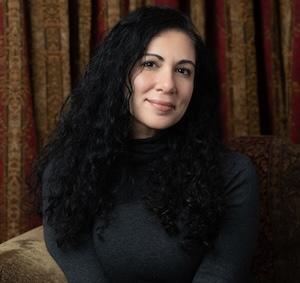
Susan Muaddi Darraj (she/her) is an award-winning writer of books for adults and children. She won an American Book Award, two Arab American Book Awards, and a Maryland State Arts Council Independent Artists Award. In 2018, she was named a USA Artists Ford Fellow. Her books include the linked short story collection A Curious Land as well as the Farah Rocks children’s book series. She lives in Baltimore, where she teaches creative writing at Harford Community College and the Johns Hopkins University. Her new novel Behind You Is the Sea was published in January 2024 by HarperVia and was selected for The New Yorker’s Best Books of 2024 Recommended List.
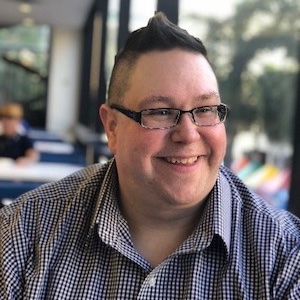
James Allen Hall (he/they) is the author of two books of poems and a book of lyric essays. Their most recent book is Romantic Comedy, winner of the Levis Prize selected by Diane Seuss and published by Four Way Books. Their previous book of poems is Now You’re the Enemy (U of Arkansas Press, 2008). They are also the author of a book of lyric personal essays, I Liked You Better Before I Knew You So Well. They’ve won awards from the Lambda Literary Foundation, the Texas Institute of Letters, the Fellowship of Southern Writers, the New York Foundation for the Arts and the National Endowment of the Arts. They were recently selected as a Civitella Ranieri writing fellow. They direct the Rose O’Neill Literary House at Washington College in Chestertown, MD.
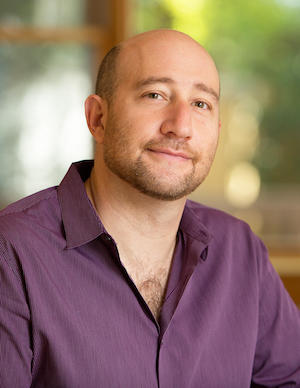
Aaron Hamburger (he/him) is the author of a story collection, The View from Stalin’s Head, which was awarded the Rome Prize by the American Academy of Arts and Letters and nominated for a Violet Quill Award. He has also written three novels: Faith for Beginners, nominated for a Lambda Literary Award, Nirvana Is Here, winner of a Bronze Medal from the 2019 Foreword Reviews Indies Book Awards, and Hotel Cuba, which was featured by NPR, named a Best Book of 2023 by Hadassah Magazine and won the 2024 Bridge Book Award for American Fiction. He has taught creative writing at Columbia University, the George Washington University, New York University, Brooklyn College, and the Stonecoast MFA Program.
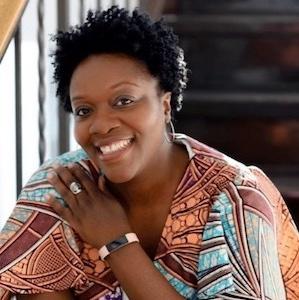
Donna Hemans (she/her) is the author of three novels, River Woman, Tea by the Sea and The House of Plain Truth, which was featured in Washington City Paper’s Spot LIT column as a best local book of 2024. Her short fiction and essays have appeared in Slice, Electric Literature, Ms. Magazine, The Rumpus and Crab Orchard Review, among others. She received her undergraduate degree in English and media studies from Fordham University and an MFA from American University. She lives in Maryland and is also the owner of DC Writers Room, a co-working studio for writers based in Washington, D.C.

Steven Leyva’s (he/him) poems have appeared in Smartish Pace, Scalawag, Nashville Review, jubilat, The Hopkins Review, Prairie Schooner, Poetry Magazine and Best American Poetry 2020. He is a Cave Canem fellow and author of the chapbook Low Parish and author of The Understudy’s Handbook, which won the Jean Feldman Poetry Prize from Washington Writers Publishing House. His next collection of poems, The Opposite of Cruelty, is forthcoming in 2025. He holds an MFA from the University of Baltimore, where he is an associate professor in the Klein Family School of Communications Design.
Tonee Mae Moll’s (she/they) debut memoir Out of Step won a 2018 Lambda Literary Award and the 2017 Non/Fiction Prize. It was also featured on the American Library Association’s annual list of notable LGBTQ+ books. Her latest poetry collection You Cannot Save Here won the 2022 Jean Feldman Poetry Prize from Washington Writers’ Publishing House. She holds a Ph.D. in English from Morgan State University and an MFA in creative writing and publishing art from the University of Baltimore. She is an assistant professor of English at Harford Community College in Maryland.
2024 Guest Writers: Sandra Beasley, celeste doaks, Robert Eversz, James Allen Hall, Donna Hemans, Steven Leyva, Cleyvis Natera and Elly Williams.
Click here to see our 2025 MFA student handbook.
The cornerstone of the low-residency MFA in creative writing is the intensive residency experience. For 10 days in June, students in the program attend residencies on the Hood College campus, during which they participate in rigorous writing workshops and attend lectures, panels and readings by permanent and guest faculty and graduating students. Residencies are designed to immerse students in activities and subjects central to the writing life and to foster a sense of community and fellowship with other writers; therefore, students are strongly encouraged to stay on campus in one of our newly renovated dorms for the duration of each residency. Visits to Frederick’s thriving historic Downtown are part of the residency; restaurants, shops, theatre, bars, art galleries, concerts and a wonderful independent bookstore are all a 10-minute walk from campus. Room and board are included in the residency fees. View a sample of the summer 2025 residency schedule here.
At the core of the residency is the writing workshop, in which developing writers share their work for critique and provide commentary on the work of other members. Led by an accomplished writer in each genre, workshops meet in the mornings every other day, and students are guaranteed an expert and detailed review of their work.
In the afternoons, faculty and graduating students present lectures and panels on a range of topics within literary history, theory and practice, while evenings are devoted to literary readings. At the end of the residency period, students return to their individual writing lives reenergized and recommitted to the practice of writing. They then commence a period of concentrated reading and writing in the semester between residencies under the close guidance of a faculty mentor.
For the second residency, students may elect to attend the Prague Summer Program for Writers, the nation’s oldest study-abroad program for creative writers in the English language. Approximately 2,000 established and aspiring writers have attended the Prague Summer Program since its inception in 1993. Included among the program’s outstanding permanent faculty are two MacArthur Fellows and a National Book Award winner in fiction. Fees for the three-week program are equal to those for a 10-day on-campus residency. Students are responsible for their own airfare and meals, but breakfast is provided with program housing. Two fully-funded teaching assistantships are available for each residency, one in poetry and one in prose. Assistantships are competitive.
Along with the residency experience, literary mentorship is a hallmark of the low-residency MFA in creative writing. The mentorship semester is designed to help students develop a close working relationship with an experienced teacher and published author who can direct them in all matters of literary craft, criticism and publishing. As immersive experiences, the mentorship semesters also provide students with a solid foundation in literary history, theory and practice, and students are expected to read broadly and deeply both within their genre and across genres.
Under the guidance of a faculty mentor, students produce original creative work while simultaneously developing their own course of study within the areas of literary history, theory, and practice. At the beginning of each semester, students confer with their faculty mentor to create a reading list, along with a submission schedule for critical essays and original work. Over the course of each semester, students submit to their faculty mentor packets of original poetry or prose and critical essays. The faculty mentor then provides extensive feedback, including suggestions for revision and further reading. Participation in the residencies is required for enrollment in the mentorship semesters.
The low-residency model for an MFA in creative writing offers several advantages compared to traditional full-residency programs, including:
With an MFA in creative writing, you can pursue a variety of career paths related to writing, literature and communication, including:
Many MFA graduates combine multiple roles or pursue a mix of freelance and traditional employment opportunities to build a diverse career in the writing field.

A new literary journal curated by Hood MFA students—now accepting submissions!

Learn about our guest writers in this Q&A series.
| Median Salary (Public Data) | Job Titles | Companies of Employment |
|---|---|---|
| $65,000 | Artistic Director | Maryland Public Television (MPT) |
| Ad Agency Copywriter | ||
| Contract Grant Writer | Penguin Random House | |
| Creative Writing Professor | ||
| Scriptwriter | Frederick Arts Council | |
| Editorial Assistant |

MFA Program Director

Assistant Director of Graduate Admission & Data Management
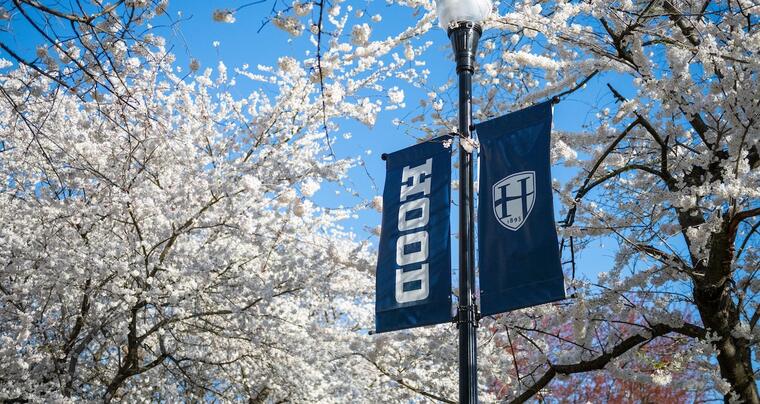
Elizabeth Knapp, Ph.D., professor of English at Hood College and founding director of Hood’s low-residency MFA in creative writing, has been named winner of the 8th Annual 3 Mile Harbor Book Award for her forthcoming poetry collection, “Causa Sui,” which…
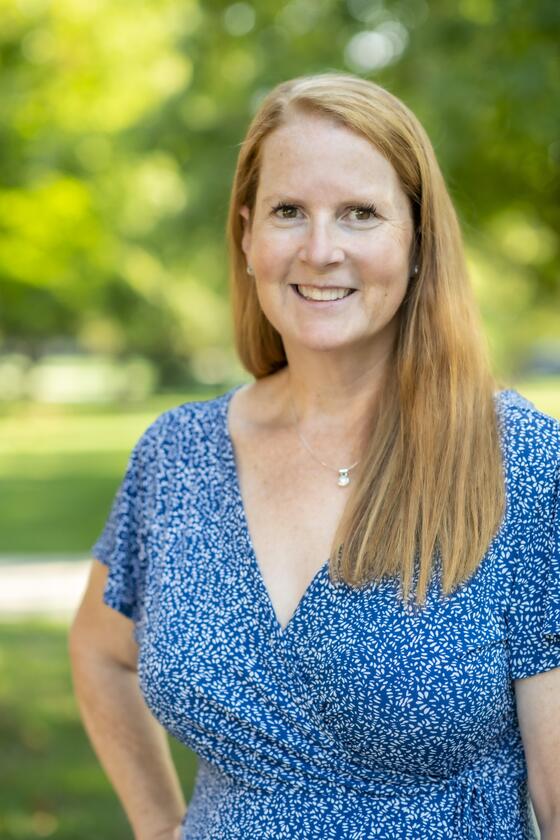
"As a student, I was pleasantly surprised at how quickly the MFA cohort bonded during our first residency. We spent nearly 10 hours a day together and got to know each other, not just through our writing, but also on a personal level."

"The smaller campus and class sizes make the most effective learning environment, and it’s what I enjoy most about attending Hood College compared to other colleges and universities in the area."
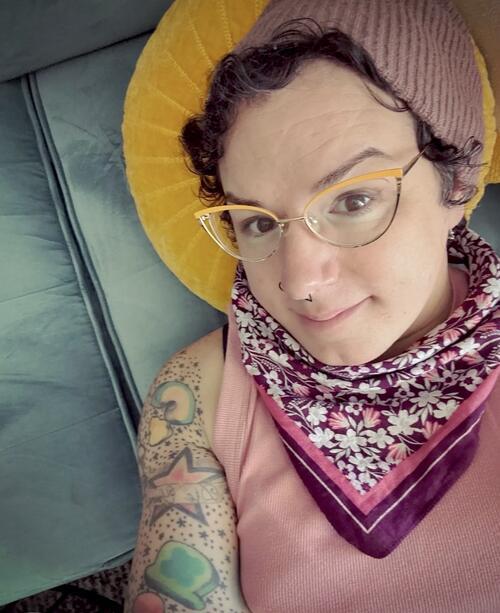
Hood’s creative writing MFA program welcomes Tonee Mae Moll as a guest writer for June 2025 residency.